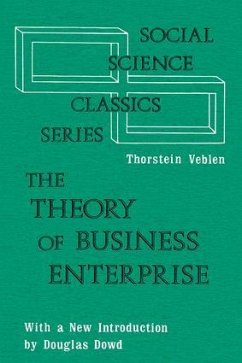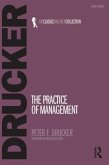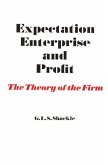Thorstein Veblen
The Theory of Business Enterprise
Thorstein Veblen
The Theory of Business Enterprise
- Broschiertes Buch
- Merkliste
- Auf die Merkliste
- Bewerten Bewerten
- Teilen
- Produkt teilen
- Produkterinnerung
- Produkterinnerung
Veblen has been claimed and rejected both by sociologists and economists as being one of theirs
Andere Kunden interessierten sich auch für
![The Practice of Management The Practice of Management]() Peter DruckerThe Practice of Management32,99 €
Peter DruckerThe Practice of Management32,99 €![The Megacorp and Macrodynamics The Megacorp and Macrodynamics]() William MilbergThe Megacorp and Macrodynamics65,99 €
William MilbergThe Megacorp and Macrodynamics65,99 €![Expectation, Enterprise and Profit Expectation, Enterprise and Profit]() G. L. S. ShackleExpectation, Enterprise and Profit61,99 €
G. L. S. ShackleExpectation, Enterprise and Profit61,99 €![Management Management]() Peter DruckerManagement49,99 €
Peter DruckerManagement49,99 €![Entrepreneurship, Small Business and Public Policy Entrepreneurship, Small Business and Public Policy]() Robert J. BennettEntrepreneurship, Small Business and Public Policy76,99 €
Robert J. BennettEntrepreneurship, Small Business and Public Policy76,99 €![Risk and Crisis Management in the Public Sector Risk and Crisis Management in the Public Sector]() Lynn T. DrennanRisk and Crisis Management in the Public Sector56,99 €
Lynn T. DrennanRisk and Crisis Management in the Public Sector56,99 €![The AI-Centered Enterprise The AI-Centered Enterprise]() Ram BalaThe AI-Centered Enterprise22,99 €
Ram BalaThe AI-Centered Enterprise22,99 €-
-
-
Veblen has been claimed and rejected both by sociologists and economists as being one of theirs
Produktdetails
- Produktdetails
- Verlag: Taylor & Francis Inc
- Seitenzahl: 426
- Erscheinungstermin: 31. Dezember 1978
- Englisch
- Abmessung: 229mm x 152mm x 25mm
- Gewicht: 612g
- ISBN-13: 9780878556991
- ISBN-10: 0878556990
- Artikelnr.: 21560836
- Herstellerkennzeichnung
- Libri GmbH
- Europaallee 1
- 36244 Bad Hersfeld
- gpsr@libri.de
- Verlag: Taylor & Francis Inc
- Seitenzahl: 426
- Erscheinungstermin: 31. Dezember 1978
- Englisch
- Abmessung: 229mm x 152mm x 25mm
- Gewicht: 612g
- ISBN-13: 9780878556991
- ISBN-10: 0878556990
- Artikelnr.: 21560836
- Herstellerkennzeichnung
- Libri GmbH
- Europaallee 1
- 36244 Bad Hersfeld
- gpsr@libri.de
Thorstein Bunde Veblen (July 30, 1857 - August 3, 1929) was an influential American economist and sociologist, renowned for his critical analysis of capitalism and his contributions to institutional economics. Veblen's most famous work, The Theory of the Leisure Class (1899), introduced the concepts of "conspicuous consumption" and "conspicuous leisure," which critique the extravagant display of wealth and status by the upper class. His work examined how the wealthy class's consumption patterns are driven by the desire to show social superiority rather than for practical use, and he argued that this behavior leads to societal inefficiency and waste. Veblen's theories also laid the groundwork for the institutional economics perspective, emphasizing the role of institutions, such as laws, customs, and social structures, in shaping economic behavior. He distinguished between "institutions" and "technology," a framework known as the Veblenian dichotomy, which remains influential in contemporary economic thought. Veblen's critiques of capitalism, alongside his focus on the broader societal context in which economic activities occur, have made him a significant figure in the field of economics and sociology.
1: The Theory of Business Enterprise
1: Introductory
2: The Machine Process
3: Business Enterprise
4: Business Principles
5: The Use of Loan Credit
6: Modern Business Capital
7: The Theory of Modern Welfare
8: Business Principles in Law and Politics
9: The Cultural Incidence of the Machine Process
10: The Natural Decay of Business Enterprise
1: Introductory
2: The Machine Process
3: Business Enterprise
4: Business Principles
5: The Use of Loan Credit
6: Modern Business Capital
7: The Theory of Modern Welfare
8: Business Principles in Law and Politics
9: The Cultural Incidence of the Machine Process
10: The Natural Decay of Business Enterprise
1: The Theory of Business Enterprise
1: Introductory
2: The Machine Process
3: Business Enterprise
4: Business Principles
5: The Use of Loan Credit
6: Modern Business Capital
7: The Theory of Modern Welfare
8: Business Principles in Law and Politics
9: The Cultural Incidence of the Machine Process
10: The Natural Decay of Business Enterprise
1: Introductory
2: The Machine Process
3: Business Enterprise
4: Business Principles
5: The Use of Loan Credit
6: Modern Business Capital
7: The Theory of Modern Welfare
8: Business Principles in Law and Politics
9: The Cultural Incidence of the Machine Process
10: The Natural Decay of Business Enterprise









